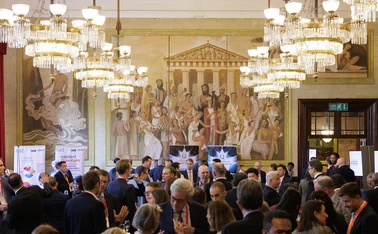
Climate initiative: HSBC
UK bank is working closely with central banks and other official institutions to support transition towards greener global system

HSBC has spent much of the past year continuing to facilitate the transition to a greener financial and economic system, by supporting green bond issuance and leading initiatives to establish new global standards on green supervision and sustainable finance for physical infrastructure. The bank has also harnessed its global footprint to support developments across the world, particularly between Asia and Europe, and played an important role in efforts to tackle one of the main problems hampering green finance: liquidity.
For example, it was co-lead arranger working with the Hong Kong Monetary Authority to issue US$2.5 billion of Hong Kong government green bonds in January this year as part of Hong Kong’s ‘green bonds programme’. It had already acted as co-arranger for a 2019 US$1 billion issue, two-fifths of which were purchased by sovereign wealth funds, central banks and supranationals. The ‘green bond programme’ uses proceeds raised to finance public work projects with environmental benefits, and has a borrowing ceiling of HK$100 billion (US$12.9 billion).
Last year, HSBC also worked with the government of Egypt – in close collaboration with the Central Bank of Egypt – to issue a $750 million, five-year inaugural green bond offering in the Middle East (which was priced at a yield of 5.25%). The proceeds from this green issuance in September 2020 will be used to finance or refinance green projects in accordance with the country’s sovereign green financing framework. The work with Egypt follows other emerging-market efforts, notably HSBC acting as a co-arranger of the first green bonds issued by an Asian sovereign issuer on behalf of Indonesia in 2019. The $1.25 billion issuance was also the largest sovereign green sukuk.
The growth of green sovereign bonds offers a route for central banks to make a start greening their portfolio, in addition to efforts to green corporate bond and equity investment or access such exposures via exchange-traded funds. While some central banks are buying green bonds, purchases remain limited compared with foreign exchange reserves, so HSBC is working with sovereign institutions to plan for the future.
“Although a number of central banks have taken the lead in ESG [environmental, social and governance], for a lot of central banks, it’s still very much a discovery phase,” says Bernard Altschuler, HSBC head of central bank coverage.
“We’ve been particularly active holding workshops for different central banks on how they can integrate ESG into their portfolios.”
One of the main challenges in ESG adoption is the portfolio composition of central banks – most still do not hold equities or corporate bonds, where ESG application is more obvious. In this area, HSBC has been helping central banks look at the possibilities for incorporating green principles into their sovereign bond portfolios, adds Altschuler.
Climate risk standards
HSBC is also co-operating with the Bank of England, the Monetary Authority of Singapore (MAS) and the Network for Greening the Financial System (NGFS) to develop new regulatory standards that account for climate-change risk. The efforts reflect HSBC’s pledge in 2017 to integrate climate risk into its credit risk assessments under the Task Force on Climate-related Financial Disclosures (TCFD). Last year, it signed up to a net-zero pathway for all its financing activities by 2050, and its own operations for 2030.
“Given that we’ve been very active on this topic very early on, we’ve been invited by a number of central banks to lead work on their behalf,” says Daniel Klier, global head of sustainable finance at HSBC.

For example, Klier chairs the Risk Management Working Group of the Bank of England’s Climate Financial Risk Forum, created in 2019. Through it, the BoE is working with the financial services industry to define best practices in climate risk management. HSBC is contributing to create guidelines for how financial institutions should modify governance, risk management, scenario analysis and disclosure to contribute to create a financial system able to fuel a greener economic model.
“The logic behind it is that organisations like HSBC have the ability to hire people and put teams around this,” says Klier.
“But if you really want to change the financial system, 100 smaller banks need to do exactly the same. As a result, we’re promoting a big outreach effort with trade associations.”
In early 2020, this forum hosted 250 institutions, including asset managers, insurance companies and banks, to discuss how they could start to get involved in this transformation.
Klier also chairs the Institute of International Finance’s Sustainable Finance Working Group, which aims to identify and promote capital markets solutions that support the development and growth of sustainable finance. The IIF serves as industry counterpart to central banks and regulators at the NGFS.
“What we do is test some ideas, making sure they are consistent with the experience of market practitioners, making sure our proposals are not biased. The IIF working group also helps us to collect evidence or data,” says Morgan Després, head of the NGFS Secretariat at the Banque de France. “For us, it’s very convenient to interact with stakeholders without necessarily having to deal with each national or regional body. They represent an international perspective.”
Meanwhile, HSBC Singapore chief executive officer Tony Cripps chairs the Green Finance Industry Taskforce (GFIT) convened by the MAS. In January 2021, the MAS issued a proposed taxonomy for Singapore-based financial institutions to identify activities complying with green financial practices or facilitate a transition towards them. HSBC’s close engagement with the MAS is one of the examples of how the bank is harnessing its global presence to spread best practices.
Squaring the circle
HSBC has also built on efforts in 2019 to work with the International Finance Corporation to set up the first green bond investment fund. The Real Economy Green Investment Opportunity (Regio) Fund raised $600 million in multilateral and private-sector capital to support climate investments in developing countries through green bonds issued by non-financial, or real-sector, companies.
“In 2018, we realised that we needed to work to develop both sides of the market, supply and demand. As an investor in emerging markets, we can go to our investee companies and help them issue green bonds – but if there are no green investors buying these bonds, it wouldn’t work,” says Alzbeta Klein, former director and global head of climate business at the IFC. This supports real-sector entities such as agribusiness, utility and energy firms that aim to go green.
“The key strength of our work with HSBC was to bring on board mainstream investment funds, pension funds and others, willing to co-invest with us in green bonds in emerging markets. HSBC did a great job to mobilise investors,” adds Klein.
Under the auspices of French president Emmanuel Macron’s One Planet Summit, HSBC is also working with the IFC and the Organisation for Economic Co-operation and Development to create a common definition on green infrastructure that would especially serve emerging countries, mobilising private investment capital. The initiative, Fast-Infra, aims to address how economies can develop sustainable ports, airports, electric grids, and so on, to create jobs that would boost the post-pandemic recovery.
“This essentially aims to replicate what the green standards have done for the green bond market,” says HSBC’s Klier.
“We want to develop an industry standard around sustainable infrastructure in emerging markets. We have about 100 institutions involved, including development banks, governments, rating agencies and central banks.”
In May 2020, the initiative hosted two global roundtables to present its goals and invite key stakeholders in the infrastructure ecosystem to join.
“Developed countries have to upgrade their infrastructure from brown to green – but in emerging markets, it is about building these infrastructure projects in the first place, and you can build them sustainably from the outset,” Klein tells Central Banking.
“If you look at emerging markets, you can build the infrastructure sustainably today, and that means that you don’t have to retrofit them in five or 15 years from now, when the effects of climate change may have a larger impact.”
This project was actually speeded up by the pandemic, Klein says: “You need to sort out both Covid-19 and climate change at the same time, because a green transformation at a global scale can boost the economic recovery and create jobs.”
This proposed new standard on green infrastructure will be one of the initiatives that are expected to be proposed in the United Nations Climate Change Conference in Glasgow in November 2021.
The Central Banking Awards were written by Christopher Jeffery, Daniel Hinge, Dan Hardie, Rachael King, Victor Mendez-Barreira, William Towning and Alice Shen
Only users who have a paid subscription or are part of a corporate subscription are able to print or copy content.
To access these options, along with all other subscription benefits, please contact info@centralbanking.com or view our subscription options here: www.centralbanking.com/subscriptions
You are currently unable to print this content. Please contact info@centralbanking.com to find out more.
You are currently unable to copy this content. Please contact info@centralbanking.com to find out more.
Copyright Infopro Digital Limited. All rights reserved.
As outlined in our terms and conditions, https://www.infopro-digital.com/terms-and-conditions/subscriptions/ (point 2.4), printing is limited to a single copy.
If you would like to purchase additional rights please email info@centralbanking.com
Copyright Infopro Digital Limited. All rights reserved.
You may share this content using our article tools. As outlined in our terms and conditions, https://www.infopro-digital.com/terms-and-conditions/subscriptions/ (clause 2.4), an Authorised User may only make one copy of the materials for their own personal use. You must also comply with the restrictions in clause 2.5.
If you would like to purchase additional rights please email info@centralbanking.com




